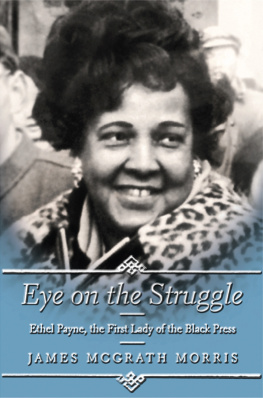Originally published m 1998 by McFarland & Com-pany Inc., Publishers.
Published 2002 by Transaction Publishers
Published 2017 by Routledge
2 Park Square, Milton Park, Abingdon, Oxon 0X14 4RN
711 Third Avenue, New York, NY 10017, USA
Routledge is an imprint of the Taylor & Francis Group, an informa business
New material this edition Copyright 2002 by Taylor & Francis.
All rights reserved. No part of this book may be reprinted or reproduced or utilised in any form or by any electronic, mechanical, or other means, now known or hereafter invented, including photocopying and recording, or in any information storage or retrieval system, without permission in writing from the publishers.
Notice:
Product or corporate names may be trademarks or registered trademarks, and are used only for identification and explanation without intent to infringe.
Library of Congress Catalog Number: 2001041586
Library of Congress Cataloging-in-Publication Data
Morris, James McGrath.
Jailhouse journalism: the fourth estate behind bars / James McGrath Morris; with a new introduction by the author.
p. cm.
Original published: Jefferson, N.C. : McFarland, 1998.
Includes bibliographical references and index.
ISBN 978-0-7658-0891-2 (pbk : alk. paper)
1. Journalism, PrisonUnited States. I. Title.
PN4888.P75 M67 2001
071'.3'086927-dc21
2001041586
ISBN 13: 978-0-7658-0891-2 (pbk)
In the spring of 2000, Washington State Representative Ida Ballasiotes decided that if the courts were unwilling to restrict the Prison Legal News (PLN) edited by inmate Paul Wright at the McNeil Island Corrections Center (see The gesture, though ill-fated, was only the most recent in a long series of salvos between Ballasiotes, the co-chair of the Washington State House Criminal lustice and Corrections Committee, and Wright, a convicted murderer and one of the nations best-known prison journalists. Even if she had succeeded in her effort, it would not have stopped Wright, whose wife, or legions of friends on the outside, would have filed the public-records requests for him. The effort, nonetheless, reflected the frustration Wrights opponents felt after a decade of doing battle with this new hybrid of the prison press-a publication produced for and by inmates but with enough of a footing outside the walls to put it beyond the reach of prison administrators.
Because it is manufactured outside the confines of prison, PLN is unlike any previous incarnations of jailhouse journalism. It could, and can, with the help of good lawyers, take advantage of the legal protections given to regular (read: non-prison) periodicals. Wright, having it printed in this fashion, overcame the main cause of the demise of Americas best prison newspapers in the 1970s and 1980s. There were no plugs to pull, no presses to remove, no offices to lock up, no budget lines to cut. PLN lives independently of the state, its funding, or even its authorization. They havent been able to come right out and censor us, said Wright, but they nibble around the edges.) in Louisiana. But the latter owed its survival to enlightened prison keepers. PLN was simply a new breed.
PLNs new approach did not make its ascent to the second largest circulating prison publication easy. Since it was launched in 1990, PLN has weathered a continuous barrage of censorship. Its first three issues, thin photocopied newsletters were banned in all Washington prisons, and guards ransacked Wrights cell, removing all his writing materials. Wright and his then-partner Ed Mead prepared a lawsuit to stop the censorship, but their challenge became moot when Washington prison officials relented, returned Wrights belongings, arid agreed to permit PLN to circulate in state prisons. This victory marked the first time in more than two decades that an inmate publication used the courts successfully to ward off state interference (see )though granted it was only a threat to use the courts that paid off. Nonetheless, Wrights action established a pattern for PLN It would be willing to use legal recourse, when administrative remedies failed, to fight off censorship. In following this course, PLN, by the end of the 1990s, grew to become the most important and visible advocate of inmate legal rights in the nation working from within the prison system.
It was a path fraught with risk, and seemingly required, at times, the skills of a high wire act. In 1991, for instance, PLN prepared to publish an account of prison guard brutality witnessed by fourteen inmates. Wright was threatened with twenty days confinement in the hole (solitary), and possibly losing thirty days in good time off his sentence after officials viewed a draft of the article. The finished copies of PLN that came in the mail, though, did contain the unexpurgated account. Under the peculiarities of the prison rules, the officials felt barred from taking an action against Wright after already having raisedand droppedthe issue earlier. Instead, they took out their scissors and cut the article out before delivering the issue to each in-prison subscriber. Responding to a demand for an explanation, Larry Kincheloe, Washington State Prison Director, wrote that the page was cut out because it posed reasonable risk of violence and physical harm to a human being and that distribution of the offending page would have been inciteful.
As PLN grew into a full-fledged magazine, with subscribers in each of the fifty states, it became increasingly difficult for state corrections officials to repeat the 1991 incident. In the decade since, PLN went to court at least ten times. Unlike with previous prison publications, the legal actions taken did not bring into question PLNs right to publish the materialas PLN is published outside of prison this was not an issue. In and of itself, this put PLN way ahead in the maze of the legal challenges that have historically faced inmate publications. The cases instead centered on the rights of the subscribers. On that score there was considerably more legal precedent in PLNs favor. Overall, the courts have supported censorship of incoming mail only if it finds that it furthers a compelling governmental interest. In other words, denying an inmate his or her copy of PLN must be based on a substantial security or rehabilitation concern. With subscribers that include judges, state attorneys general, and legislators, PLNs visibility within the legal community works to its favor when a court adjudicates such a case. ludges are often familiar with PLN editorial content and thus are less easily swayed by the arguments made by corrections officials that the paper poses a danger to prison order.









